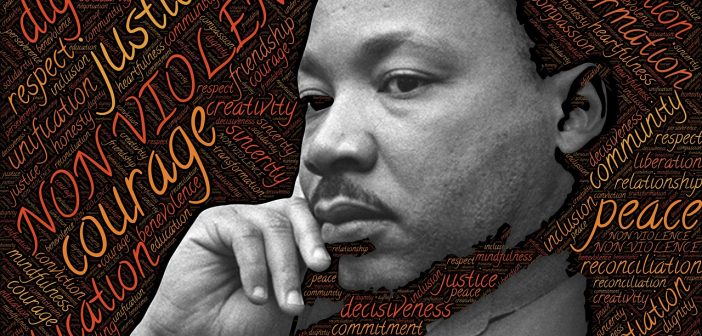Baltimore Pastor C. Anthony Hunt lifts up Martin Luther King, Jr.’s powerful vision of the Beloved Community, calling on individuals and churches to continue to promote peace with justice. He provides ten suggestions for heightening our commitment to community building and social engagement.
A universal human striving is for authentic community. Dr. Martin Luther King, Jr., was among those who framed the conception of community in what he termed the Beloved Community. King asserted that “all life is interrelated.” This interrelatedness was rooted, for King, in the fundamental belief in the kinship of all persons. He believed that all life is part of a single process; all persons are sisters and brothers, and we all have a place in the Beloved Community. Because all of us are interrelated, one cannot harm another without harming oneself.
We can continue to pursue Dr. King’s vision of the Beloved Community by making a sincere commitment to community-building and social engagement.
King also said “everyone could be great because everyone could serve.” In these uncertain times, churches and our broader society must make a sincere commitment to engaging in acts of compassion and justice as means of living out our faith and loving our neighbors. Individuals, churches, groups, organizations, institutions and even governments can continue to pursue Dr. King’s vision of the Beloved Community by making a sincere commitment to community-building and social engagement.
Here are ten ways that individuals, churches, and other organizations can promote peace with justice.
- Support and develop community-wide plans aimed at expanding economic opportunities for racial-ethnic persons and women specifically in the areas of housing, banking, and employment practices.
- Actively participate in programs that reach out to help those in the most need — the hungry, the homeless, and the unemployed.
- Do your part to assure that every inner city and rural young person can look forward to an adequate education. Adopt an inner-city or rural school. Offer your skills where appropriate.
- Encourage schools, colleges, and universities in your area to include the teachings of Dr. King and other freedom fighters in their curricula and programs.
- Take specific actions to deal with the problems of drugs, alcohol dependency, teenage pregnancy, and family violence in your community.
- Advocate for the removal of all weapons from our streets, homes, and schools. Support causes that promote freedom, justice, and peace abroad.
- Help extend human rights, dignity, health, and economic well-being to all persons.
- Actively oppose groups that promote hatred and violence. Vigilantly oppose racism, homophobia, xenophobia, and other forms of hatred in our communities.
- Sponsor and participate in programs that encourage interracial, intercultural, and inter-religious goodwill and unity.
- Read the Social Principles of your denomination, and strive to make them an integral part of your life and the life of your church and community.
Related Resources:
- The Church and Race Relations — Then and Now by Tony Hunt
- Nelson Mandela — A Leader for His Time by Lovett H. Weems, Jr.
- Leadership Lived: Clementa Pinckney and Open Doors by Lovett H. Weems, Jr.






